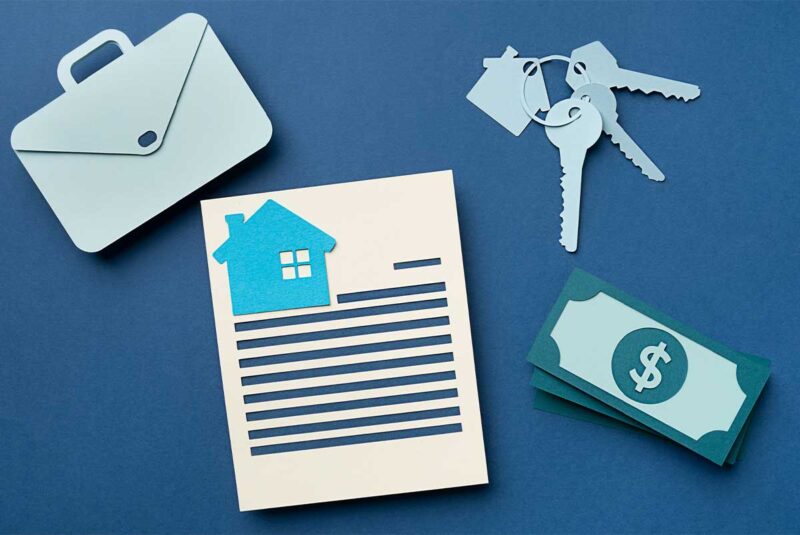Ready To Buy a Home?
Get Approved to Buy a Home
Rocket Mortgage® lets you get to house hunting sooner.
You know you’re ready to become a homeowner. But when you apply for a conventional loan with a bank, credit union or online lender, you’re getting turned down.
Maybe it’s because you’re a first-time buyer and your credit score isn’t high enough or you haven’t built up enough of a credit history. Or maybe you’ve had credit issues in the past, like a bankruptcy or foreclosure.
Never fear. When you can’t qualify for a conventional mortgage loan, you can still take advantage of a Federal Housing Administration (FHA) loan to purchase your home. If an FHA home loan sounds like a possible solution for you, the first step in getting financing is to apply for preapproval.
This guide defines FHA loan preapproval, explains how it works and gives you the information you need to feel confident when you begin the process of applying for an FHA mortgage loan.
What Is an FHA Loan?
Explore Your Mortgage Options
What are you looking to do?
An FHA loan works just like any conventional mortgage. You go to a lender like a bank, credit union or online lender, fill out a loan application and work with a loan officer. The difference? With an FHA loan, the U.S. Department of Housing and Urban Development agrees to cover the lender if you default on your loan.
Because the lender knows they’re covered, they can offer you a loan even if you don’t meet the minimum standards for conventional loans. With an FHA loan, you can buy a home with a credit score of 580 and as little as 3.5% down, or with a credit score of 500 if you can put at least 10% down.[1]
While FHA home loans have mortgage rates that are a little higher than conventional mortgage loans, they’re still a good loan type for first-time home buyers or home buyers who have had prior credit issues or perhaps a bankruptcy.
What Is FHA Loan Preapproval?
The first step is to apply for preapproval, which is how you find out if you’re likely to qualify for financing from an FHA-approved lender.
It’s important to understand that preapproval isn’t the same as loan approval. Although it doesn’t happen often, it’s possible to be preapproved and then turned down for a mortgage.
How Do You Get Preapproved for an FHA Loan?
Getting preapproved for an FHA mortgage loan is essentially the same as getting preapproved or prequalified for a conventional mortgage. However, there are a few additional requirements that you’ll need to consider when you start the preapproval process.
Basic loan requirements
To get preapproved, you’ll need to meet some basic FHA loan requirements.
Proof of identity: You’ll need to verify your identity by showing the lender a government-issued ID like a state-issued driver’s license or passport and your Social Security card or other proof that you’re a legal resident.
Credit score: Minimum 580 with 3.5% down or minimum 500 with 10% down.
Debt-to-income (DTI) ratio: 43% or lower. Your DTI is your fixed monthly expenses (rent or mortgage payments, credit card minimums, student loan payments, personal loan payments, auto loan payments) divided by your gross monthly income.[1]
Proof of income: When you apply for FHA mortgage preapproval, expect to provide proof of income to the lender. Ideally, you should be able to demonstrate at least 2 years of consistent employment or income. The lender may ask you to provide pay stubs, W-2 forms, tax returns and statements related to any income-producing investments you have.
If you are self-employed or work seasonally or on commission, you may need to provide bank statements showing a steady stream of income.
Foreclosure and bankruptcy resolution
If you’ve had credit issues in the past like foreclosures or bankruptcies, you’ll need to meet the following criteria:[2]
- All prior foreclosures were completed over 36 months in the past and you’ve reestablished good credit.
- Prior Chapter 7 bankruptcies need to have been discharged over 24 months ago.
- Prior Chapter 13 bankruptcies don’t have to be discharged, but you need to have satisfactorily made your payments for at least 12 months since the start of your payout period.
These FHA wait times are half the times required for conventional mortgage loans.
Down payment and closing costs
Finally, you’ll need to prove that you have enough funds to pay closing costs and cover your down payment. Expect to pay at least 3.5% down, plus closing costs equal to roughly 6% of the loan value.
One closing cost you’ll need to deal with when you buy a home with an FHA loan is your upfront mortgage insurance premium. When you buy a home using an FHA loan, you are required to pay an upfront fee of 1.75% of the loan amount or $1,750 for every $100,000 of loan value.[3]
You can either pay this upfront and out-of-pocket or you can fold it into your mortgage. It means you pay less upfront, but it adds to the loan balance.
The good news is that an FHA loan can help you access down payment assistance programs including gifts, grants, forgivable/deferred loans or 0% interest or low-interest loans.
FHA loan limits
To buy a home with an FHA loan, your mortgage loan will need to fall within the FHA maximum loan limits. For a single-family home, these range from $472,030 – $1,089.300, depending on where you plan to buy your home.[4] If you plan to buy a multifamily home with up to 4 units, you can borrow more as long as you plan to live in one of the units.
FHA minimum property standards
Even if you’re preapproved, you won’t be able to buy a home unless it meets the FHA minimum property standards. These standards ensure that the home you’re buying is structurally sound and safe for you to live in. The appraisals to confirm compliance are similar to the ones that most lenders will require when you buy a home.
The process is fairly standard, but your lender may have additional requirements. Talk with your real estate agent and lender early on to ensure you gather the right information to prevent delays in the appraisal process.
What Happens When You Get Preapproved
When you apply for preapproval, the lender verifies the information you provide. If your information checks out, the lender gives you a preapproval letter. The letter lists the amount the lender is willing to lend you and the interest rate you’re approved for.
It doesn’t guarantee that you’ll get a loan, but it’s a good starting point that shows sellers you’re a serious home buyer and a mortgage lender is taking your application seriously.
How Long Does it Take To Get Preapproved for an FHA Loan?
The time it takes to get FHA mortgage preapproval depends on two key factors. The first is the completeness of your application. If the lender has to chase you down for additional information, it will take longer for the application to be reviewed.
The second factor is the lender you choose. Some lenders take longer than others to review preapproval applications, especially if they’re dealing with a large volume of applications in a short amount of time.
Some lenders decide within one business day, while others take more than a week to let you know if you’re preapproved.
How Long Does FHA Approval Last?
FHA loan preapprovals don’t last forever. In fact, they typically expire after 60 – 90 days. They don’t last indefinitely because a lot can change in a few short months, including your credit score or the amount of money you have for a down payment.
Because FHA preapprovals have an expiration date, good timing is essential. If you apply too early, your preapproval may expire before you find the perfect home, forcing you to start the process all over again.
Waiting too long can also hurt your chances of landing your dream home, as you may miss out on a great listing because you don’t have your preapproval done. You should seek FHA loan preapproval early in the process of looking for a home.
Why Would a Lender Deny Preapproval for an FHA Loan?
What if the lender looks at your information and turns you down? A lender may decide to not preapprove you for an FHA for several reasons. We’ve listed some of the most common reasons for denial.
High debt-to-income ratio
Your debt-to-income ratio compares the amount of debt you have with the amount of income you earn. The FHA loan program typically allows a borrower to have a DTI of 43%, although you may qualify for an exception if you have substantial cash savings.
If your debt-to-income ratio exceeds 43%, the lender may deny your application. Paying off some of your debt and/or increasing your income can help you lower your DTI enough to qualify for FHA loan preapproval the next time you apply.
Poor credit history
When a lender pulls your credit report, they’re looking for proof that you manage your finances responsibly. This includes making on-time payments, not taking on too much debt and not having any recent negative public records on your credit file. If your credit report has too many red flags, they may decide you’re not a good risk, even if the U.S. government is backing up the loan.
Insufficient funds
Even though the FHA program requires a small down payment, you still need funds on hand to pay closing costs, property taxes and homeowners insurance. Your lender may also require cash reserves to prove you can make your first few mortgage payments.
Your preapproval application may be denied if you don’t have enough cash to cover your closing costs. In addition, if your financial situation makes the lender question your ability to make your mortgage payments, they can deny the preapproval.
May the Preapproval Odds Be Ever in Your Favor
Once you’re preapproved and make an offer on a house, an underwriter will review your application and determine whether to approve you for a mortgage. While this is happening, it’s important to continue saving money and paying your debts on time.
Making the effort to keep your credit score and bank balances high enough to qualify for an FHA loan could improve your odds of buying your own home.
Get approved to buy a home.
Rocket Mortgage® lets you get to house hunting sooner.
The Short Version
- FHA preapproval indicates that you're likely to qualify for financing from an FHA-approved lender
- Each preapproval letter has an expiration date, meaning time is of the essence when shopping for a home
- You can improve your chances of preapproval by keeping good financial records
Federal Deposit Insurance Corporation. “203(b) Mortgage Insurance Program.” Retrieved April 2022 from https://www.fdic.gov/consumers/community/mortgagelending/guide/part-1-docs/203b-mortgage-insurance-program.pdf
U.S. Department of Housing and Urban Development. “Section C. Borrower Credit Analysis Overview.” Retrieved April 2022 from https://www.hud.gov/sites/documents/4155-1_4_SECC.PDF
U.S. Department of Housing and Urban Development. “APPENDIX 1.0 – MORTGAGE INSURANCE PREMIUMS APPENDIX 1.0 – MORTGAGE INSURANCE PREMIUMS.” Retrieved April 2022 from https://www.hud.gov/sites/documents/15-01MLATCH.PDF
U.S. Department of Housing and Urban Development. “FHA Mortgage Limits.” Retrieved January 2023 from https://www.hud.gov/program_offices/housing/sfh/lender/origination/mortgage_limits




